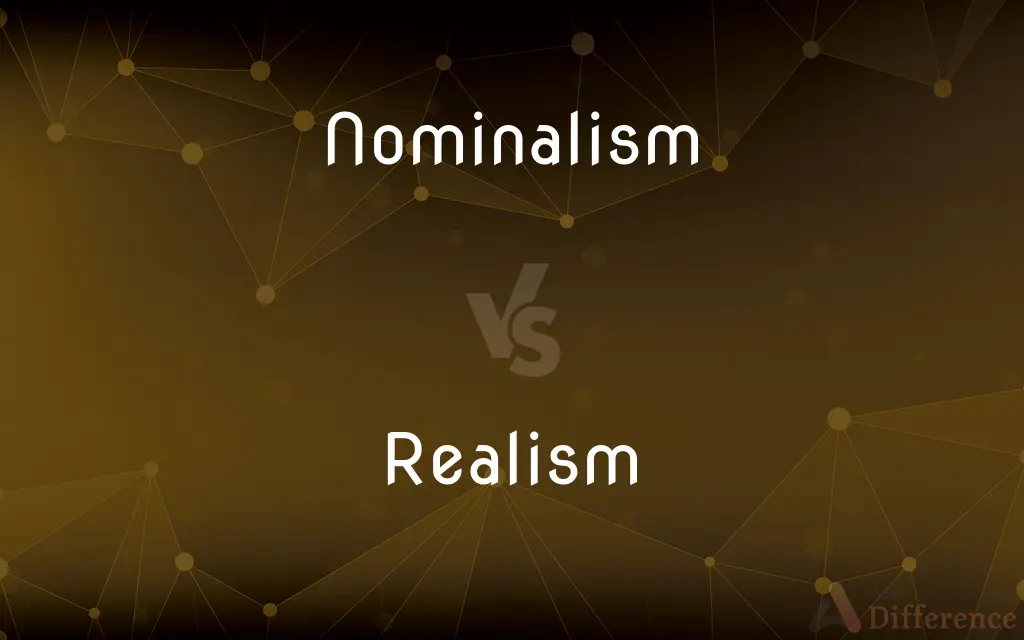Nominalism vs. Realism — What's the Difference?
By Tayyaba Rehman — Updated on October 13, 2023
Nominalism asserts that universals or general ideas are mere names without real existence, whereas Realism holds that such universals exist independently of individual things.

Difference Between Nominalism and Realism
Table of Contents
ADVERTISEMENT
Key Differences
Nominalism and Realism are philosophical positions concerning the existence of universals. Nominalism claims that universals, like "redness" or "beauty," are simply names or concepts and don't have any real existence outside of the names we give them. Thus, under Nominalism, only individual, particular objects truly exist, and general terms are merely convenient labels.
In contrast, Realism posits that universals do indeed exist, separate from the individual objects that exemplify them. Realists would argue that when we see two different red apples, they share in the universal concept of "redness." This "redness" has a reality beyond just being a name, suggesting that there are abstract entities or qualities shared by particular things.
The debate between Nominalism and Realism goes back to ancient times and touches on the nature of reality and knowledge. For Nominalists, the world consists of particular entities, and any categorization or generalization is a result of human cognition. On the other hand, Realists would argue that these categories or universals have an objective reality, existing outside of human understanding.
Furthermore, while Nominalism tends to emphasize the limitations of language in capturing the true nature of the world, Realism leans towards the idea that language can, to an extent, reflect the underlying structures and universals of reality.
Comparison Chart
Basic Belief
Universals are mere names without real existence.
Universals have real existence independent of particulars.
ADVERTISEMENT
View on Language
Language offers convenient labels without denoting real universals.
Language can reflect real universals in the world.
Historical Roots
Associated with thinkers like William of Ockham.
Rooted in the works of Plato and Aristotle.
Application
Views categories as human-made constructs.
Believes in objective categories in nature.
Ontological Stance
Only individual, particular entities truly exist.
Both particular entities and universals exist.
Compare with Definitions
Nominalism
Nominalism (Philosophical stance on universals)
The debate between Nominalism and Realism has shaped Western philosophy.
Realism
Realism (Affirmation of universals)
Realism posits the independent existence of abstract entities.
Nominalism
Nominalism (Epistemological perspective)
From a Nominalist standpoint, knowledge is rooted in particulars.
Realism
Realism (Philosophical view on universals)
Realism has been a dominant perspective in classical philosophy.
Nominalism
Nominalism (Denial of independent universals)
Nominalism rejects the existence of universals outside human cognition.
Realism
Realism (Belief in objective reality)
Realism holds that there's an objective world outside our perceptions.
Nominalism
Nominalism (Belief in language's limitations)
Nominalism highlights how language can misrepresent reality.
Realism
Realism (Ontological stance)
In Realism, both the abstract and the concrete have genuine existence.
Nominalism
Nominalism (Focus on particularities)
Nominalism emphasizes the concrete over the abstract.
Realism
An inclination toward literal truth and pragmatism.
Nominalism
In metaphysics, nominalism is a philosophical view which denies the existence of universals and abstract objects, but affirms the existence of general or abstract terms and predicates. There are at least two main versions of nominalism.
Realism
The representation in art or literature of objects, actions, or social conditions as they actually are, without idealization or presentation in abstract form.
Nominalism
The doctrine holding that abstract concepts, general terms, or universals have no independent existence but exist only as names.
Realism
The scholastic doctrine, opposed to nominalism, that universals exist independently of their being thought.
Nominalism
(philosophy) A doctrine that universals do not have an existence except as names for classes of concrete objects.
Realism
The modern philosophical doctrine, opposed to idealism, that objects exist independently of their being perceived.
Nominalism
The principles or philosophy of the Nominalists.
Realism
A concern for fact or reality and rejection of the impractical and visionary.
Nominalism
(philosophy) the doctrine that the various objects labeled by the same term have nothing in common but their name
Realism
An artistic representation of reality as it is.
Realism
(sciences) The viewpoint that an external reality exists independent of observation.
Realism
(philosophy) A doctrine that universals are real—they exist and are distinct from the particulars that instantiate them.
Realism
As opposed to nominalism, the doctrine that genera and species are real things or entities, existing independently of our conceptions. According to realism the Universal exists ante rem (Plato), or in re (Aristotle).
Realism
Fidelity to nature or to real life; representation without idealization, and making no appeal to the imagination; adherence to the actual fact.
Realism
The practise of assessing facts and the probabilities of the consequences of actions in an objective manner; avoidance of unrealistic or impractical beliefs or efforts. Contrasted to idealism, self-deception, overoptimism, overimaginativeness, or visionariness.
Realism
The attribute of accepting the facts of life and favoring practicality and literal truth
Realism
(philosophy) the philosophical doctrine that physical object continue to exist when not perceived
Realism
The state of being actual or real;
The reality of his situation slowly dawned on him
Realism
An artistic movement in 19th century France; artists and writers strove for detailed realistic and factual description
Realism
(philosophy) the philosophical doctrine that abstract concepts exist independent of their names
Realism
Realism (Epistemological perspective)
Realism claims that our knowledge can reflect the true nature of the universe.
Common Curiosities
Which philosophy emphasizes the limitations of language?
Nominalism emphasizes the constraints of language in representing reality.
How do Realists view the relationship between language and reality?
Realists believe language can reflect the underlying structures of reality.
Are the concepts of Nominalism and Realism modern?
No, they trace back to ancient philosophical debates.
Do Nominalists deny the existence of objective categories in nature?
Yes, Nominalists view categories as human-made constructs.
Is Realism more aligned with objective or subjective reality?
Realism aligns with the belief in an objective reality.
How does Realism view universals like "redness"?
Realism holds that such universals have independent existence outside of individual objects.
What does Nominalism say about the existence of abstract entities?
Nominalism denies the independent existence of abstract entities.
Which philosophy has been more dominant in classical philosophy?
Realism has been a more dominant perspective historically.
How does Realism approach the nature of knowledge?
Realism believes our knowledge can mirror the true nature of the universe.
Which philosophy believes in both particular entities and universals?
Realism holds that both particular entities and universals exist.
Are there modern forms of Nominalism and Realism?
Yes, the debate has evolved, and contemporary versions of both views exist.
What does Nominalism claim about universals?
Nominalism asserts that universals are mere names without real existence.
How does Nominalism view human cognition's role?
Nominalism sees categorizations and generalizations as results of human cognition.
Which philosophy believes language can misrepresent reality?
Nominalism believes that language can often misrepresent reality.
Which view is more skeptical of general terms and categorizations?
Nominalism is more skeptical of the real existence of general terms and categorizations.
Share Your Discovery

Previous Comparison
Pantheon vs. Parthenon
Next Comparison
Baseband vs. BroadbandAuthor Spotlight
Written by
Tayyaba RehmanTayyaba Rehman is a distinguished writer, currently serving as a primary contributor to askdifference.com. As a researcher in semantics and etymology, Tayyaba's passion for the complexity of languages and their distinctions has found a perfect home on the platform. Tayyaba delves into the intricacies of language, distinguishing between commonly confused words and phrases, thereby providing clarity for readers worldwide.














































